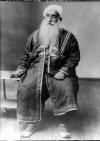|
saLT |
the-south-asian Life & Times January - March 2011 |
|
|||
|
Cover Story Eminent
Pandits Veer Munshi Pradman Kaul Pandit Bhajan
Sopori Photo
Feature Aviation
Wildlife Comment
|
|
||||
|
Kashmiri Pandits – A 5,000-Year Heritage of the Valley A SALT Feature The Kashmiri Brahmins, or Pandits as they are generally known, are the
original inhabitants of Kashmir (India’s northernmost state known for its
stunning natural beauty). Fewer than 500,000 in number, they are highly
educated, and known for their progressive and secular views. Most are
engaged in the medical, education, and government professions. India's first
Prime Minister, Jawaharlal Nehru, was a Kashmiri Pandit. The Pandits' story
today is one of the tragic and often overlooked footnotes of a conflict that
has claimed thousands of lives, and forced hundreds of thousands from their
native land into exile in their own country. In the early 1990s, most Pandits were driven out of Kashmir
- their ancestral homeland of 5000 years – by a systematic campaign of
assassinations and intimidation by the Islamic terrorists, often trained on
foreign soil. The killings of prominent citizens became increasingly random
and gruesome. A swift and organised blitzkrieg of "fear psychosis in the
valley, orchestrated to inflict fear and insecurity amidst the minority
community, began on the evening Some members of this once vibrant community have now resettled in other parts of India and started new lives. Others remain in dismal camps outside Jammu, where they still live a life of hopelessness and despondency. A minority stayed on, counting on the assurances of their Muslim neighbours that they would be safe. But despite the goodwill of Muslim friends and neighbours, terrorists continued their ‘cleansing’ pogrom. In March 2003, a group of terrorists killed 24 of the 52 Pandits living in the tiny hamlet of Nadimarg, about 35 miles south of the summer capital, Srinagar. The dead included 11 women and 2 children. Muslims from the area sat by the bodies of their Hindu neighbours, wailing, beating their chests and cursing the killers. Despite the brutality and humiliation that Pandits have suffered in the past two decades, they have never resorted to, and repeatedly rejected, any form of counter-violence. Kashmiri Pandits have paid a heavy price for their nonviolent and tolerant behaviour. They have lost ancestral land, homes, property, businesses, emotional assets, family, neighbours, friends – and most of all - their way of life. Memories are what they are left with – of good and bad times.
Read the article in the print edition
|
|||||
|
Copyright © 2000 - 2011 [the-south-asian.com]. Intellectual Property. All rights reserved. |
|||||
